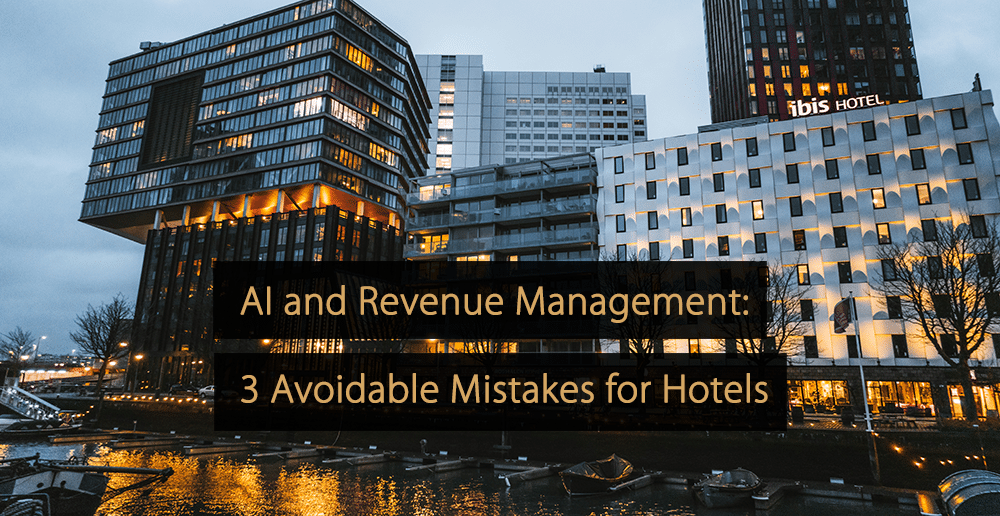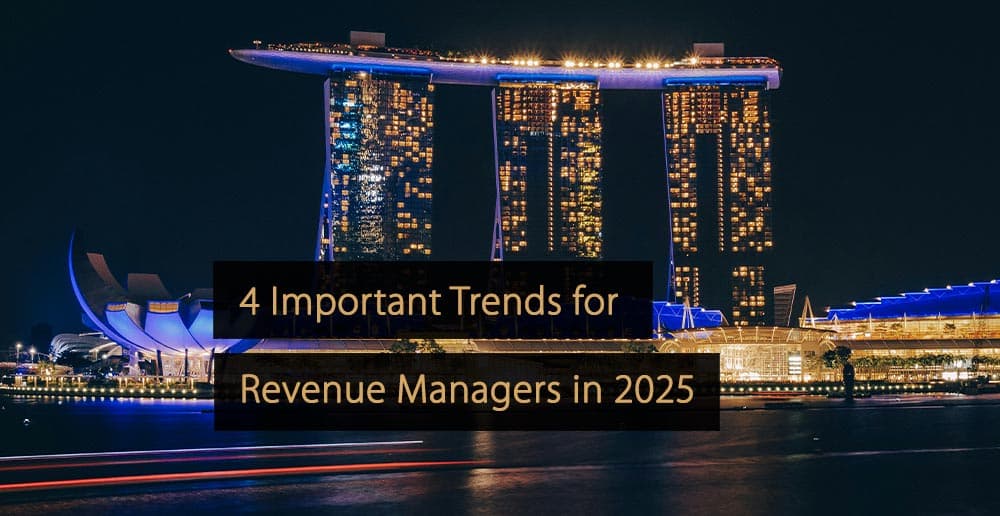A significant part of getting the most out of a hotel revenue management strategy involves keeping up with the latest revenue management trends and implementing associated strategies while investing in relevant technology. In this article, you can learn all about the latest revenue management developments in 2026 to stay ahead of the game.
Table of Contents:
- Understanding the Basics of Revenue Management
- Keep Up to Date With the Latest Revenue Management Trends
- 24 Revenue Management Trends in 2026 to Stay Ahead of the Game
- 1. Omnichannel Data in Hotel Revenue Management
- 2. Using Artificial Intelligence in Revenue Management
- 3. Ancillary Revenue Management Pricing
- 4. Total Revenue Management
- 5. Hotel Technology
- 6. Cross-Departmental Collaboration
- 7. Data, Data, and More Data
- 8. Forward-Looking Market Demand
- 9. Data Visualization
- 10. Competitive Pricing Strategies
- 11. Accurate and Intelligent Forecasting
- 12. Positional Pricing Strategies
- 13. Real-Time Data Analysis and Insights
- 14. Automation in Revenue Management
- 15. Use of Cloud Technology
- 16. Discount Pricing Strategies
- 17. Dynamic Optimization
- 18. Dynamic Package Creation
- 19. Customer Retention as a Priority
- 20. Mobile Optimization Strategies
- 21. Customer Loyalty Programs
- 22. Focusing On Predictable Demand
- 23. Price per Segment Strategies
- 24. Price Sensitivity Analysis
- More Revenue Management Strategies
- More Revenue Management Tips
- Hotel Marketing Trends
- The Most Important Hotel Software Solutions
Understanding the Basics of Revenue Management
Before getting into some of the specific revenue management trends you should be aware of, it is important to understand what revenue management is. Essentially, it is the practice of selling the best product to the best person at the best time for the best price using the best channel to maximize financial results. According to the Duetto Revenue Management Trends & Predictions Survey, hoteliers now rank revenue management 4.8 out of 5 in terms of importance to their business.
Check out the “Revenue Management; Clearly Explained!” article for a much more comprehensive explanation of revenue management, the history of revenue management, why it is so valuable, how it differs from the similar concept of yield management, and the main key performance indicators (KPIs) that are used to track performance.
Keep Up to Date With the Latest Revenue Management Trends
Revenue management is vital for those in the hotel industry hoping to maximize financial results. It is a process that uses data and other information to anticipate demand to optimize pricing, distribution, and marketing. However, keeping up with the latest revenue management trends is crucial, too. The hotel revenue management system market is projected to reach $29.43 billion by 2031 at an 8.7% compound annual growth rate, according to Verified Research Market.
After all, consumer behavior is changing all the time, and new technology emerges and becomes more important. Moreover, the distribution landscape is constantly developing, and new strategies are always being tested. By keeping up to date, you can get the most out of your business and stay ahead of your rivals.
Hotels that switch to using revenue management software show an average increase in RevPAR between 7% and 20%, with some properties experiencing even higher gains. However, Skift Research analysis shows that only 28 percent of hotels utilize RMS tools. The analysis presents massive growth opportunities for forward-thinking properties willing to invest in advanced systems and strategies.
As Ryan Mummert, Senior Principal at Capgemini, notes:
“The rapid pace of technological change, including the adoption of AI and machine learning, requires significant investment in new systems and training for staff. Hospitality revenue managers must stay updated with the latest innovations to remain competitive.”
24 Revenue Management Trends for 2026 to Stay Ahead of the Game
In this section, you can learn about 24 of the main revenue management trends you need to be aware of in 2026. As a revenue manager or business leader in the travel and tourism industry, understanding these trends and adopting the associated strategies can help you gain a competitive edge.
1. Omnichannel Data in Hotel Revenue Management
Among the key revenue management trends has been a greater focus on omnichannel data and effective analysis of that data. According to the Hospitality Technology Study, 72% of hoteliers prioritize improving analytics capabilities as a strategic initiative.
Essentially, omnichannel data refers to data gathered from all customer interactions across all channels. Crucially, this data is viewed holistically rather than being kept separated according to those channels. According to Hotel Tech Report, hotels implementing omnichannel strategies report up to 494% higher order rates than single-channel campaigns.
When viewed as a whole, this data can provide useful insights to assist with revenue management. For instance, it might help uncover some of the sticking points in the customer journey or some of the common customer issues. Addressing these problems can then boost revenue generation and overall financial results.
As DJ Vallauri, CEO of Lodging Interactive, explains:
“Omnichannel marketing considers all channels to create the best customer experience. By using a consistent strategy, hotels can develop stronger connections with guests and ultimately drive direct revenue.”
Table: Key Aspects of Omnichannel Use in Hotel Revenue Management
2. Using Artificial Intelligence in Revenue Management
The use of artificial intelligence technology is another major revenue management trend hotels need to be aware of. According to Oracle NetSuite, analysts estimate that the AI market in hospitality is projected to grow by 60% annually, reaching over $8 billion from $90 million by 2033.
AI can be extremely valuable in this area because gathering and analyzing data is crucial to revenue management. AI is able to analyze data and extract insights far quicker than humans can.
AI can also allow many of the key revenue management activities to be fully or partially automated. For instance, AI could analyze trends within data and determine that the most effective course of action would be to reduce room rates. AI could also be configured to carry out this adjustment at the ideal time automatically.
The impact is clear. According to the Hotel Revenue Management Systems Statistics report, hotels adopting machine learning–driven RMS in early 2025 achieved a 15% revenue increase and a notable rise in off-peak season bookings. Today, AI is more than a tool. It is a revenue growth engine.
Video: Revolutionizing Hotel Revenue Management with AI and Machine Learning
3. Ancillary Revenue Management Pricing
Ancillary revenue management refers to revenue management related to additional hotel services beyond selling hotel rooms. There are many different examples of ancillary services, including on-site food services, on-site drinks services, leisure services, spa services, tours, event hosting, a gift shop, or even food deliveries.
For hotels, ancillary services provide an opportunity to maximize revenue, and optimizing these extra revenue streams has become one of the biggest revenue management trends. There is still a strong strategic element, such as setting extra services at the right price, adjusting prices based on demand, and promoting these services effectively.
Annual industry reports indicate that ancillary revenue can make up more than 18% of a hotel’s total income. For example, CBRE data shows U.S. hotel spas grew spa revenue per available room (PAR) by 12.6% from 2018 to 2022, with resort spas rising 14.2%. According to an Oracle study, 49% hoteliers strongly agree that special amenities and upselling are critical to their revenue strategy.
Patrick Landman, CEO and founder of XOTELS, identifies four key strategies for ancillary revenue growth:
“Create Packages: Selling an experience vs. ‘just a room’. Target a Client Niche Market: Drive revenue by increasing relevance to specific client markets. Get ROI from Underutilised Areas: Got an empty space in your hotel? Turn it into a coworking space, a self-service kiosk, an event room—you name it.”
4. Total Revenue Management
Among the most significant revenue management trends to be aware of is the concept of total revenue management. Within hotels, revenue management is usually focused on pricing, distribution, and marketing of hotel rooms. Yet, with total revenue management, the focus turns to generating as much money as possible from all revenue streams.
In truth, the concept of total revenue management is nothing new. Still, a combination of factors, including technological limitations and a lack of understanding within the industry, meant that the focus was often more narrow in the past. However, hotels can greatly boost their results by adopting a total revenue management approach. If you want to learn more about this revenue management trend, read “Total Revenue Management: How Hotels Can Maximize Their Revenue.”
Video: Total Hotel Revenue Management
5. Hotel Technology
New and emerging technology will always be one of the most critical revenue management trends to keep pace with. Some of the biggest technology trends include the use of hotel management software, the rise of specialist revenue management software, and other tools, like upselling software. According to the Revenue Management System Market Report by The Insight Partners, the global revenue management system market is projected to grow to $37,106.75 million by 2028.
Meanwhile, business intelligence software is increasingly used to facilitate and support data-based business decision-making. The Lodging Technology Study shows that hotels allocate over 4.2% of overall revenue to IT budgets, and 95% of hoteliers believe next-generation PMS can streamline operations and reduce costs.
Of course, the nature of hotel technology is that it constantly evolves, so it is essential always to remain aware of new developments and be willing to adopt new approaches.
As noted by CBRE’s VP of Global Hotel Asset Management, Miri Vasilevsky-Pinto,
“A hotel’s success isn’t confined to room rates but extends to a variety of revenue sources. Technology and data lead us to maximum profitability by providing personalized experiences that captivate guests across every part of the journey.”
For more information about hotel technology, read “Hotel Technology Trends: Upcoming Innovations You Must Know.”
6. Cross-Departmental Collaboration
Another key revenue management trend to be aware of is the heightened need for cross-departmental collaboration. This has always been a major part of effective revenue management because different departments must collaborate to share relevant data and ensure their strategies align with broader business objectives.
However, collaboration has become even more critical in light of the rise of total revenue management. For instance, not only should a hotel look to upsell and cross-sell on a broad level, such as including restaurant bookings within sales, but each department should also upsell and cross-sell, such as selling larger meals or extras, like wine, dessert, etc. Revenue management forecasts can also assist housekeeping, restaurant, and kitchen staff with planning.
7. Data, Data, and More Data
Data is at the heart of any good revenue management strategy, and the array of data available to hotels is vast, including historical data, current trends, competition data, wider market data, online reviews, data in the books, and more. This requires careful use of data analytics to achieve the best outcomes.
According to McKinsey, advanced analytics in hospitality can drive significant operational improvements. Future Market Insights reports increasing investment in analytics technologies across hospitality chains in Europe and Asia.
Analysis of the data needs to be carried out in a structured way, and the data needs to be interpreted so that it can be used to inform decisions. From there, strategies can be adjusted based on what data tells you about the present market situation, future demand, and other needs, leading to better decisions and business outcomes.
Real-world examples highlight its impact. According to Future Market Insights, Accor Hotels used predictive analytics in its Southeast Asian properties to achieve 95% occupancy and a 28% RevPAR boost during Singapore’s F1 Grand Prix.
8. Forward-Looking Market Demand
Historically, revenue management has relied on past data to anticipate future demand. However, one of the major revenue management trends you need to know about is the rise of forward-looking market demand data. This refers to clear data regarding future demand levels, typically from competitors.
Those involved with hotel management can access data on the books for rival hotels and other forms of data that can be used to gain a much clearer sense of what demand will look like in the future. It becomes much easier to make firm plans for strategically responding using that information.
9. Data Visualization
To reach peak performance, it is essential that you continuously monitor and understand business performance. What are your main revenue streams? What is the revenue per distribution channel? What costs are associated with each distribution channel? What is the current book’s performance per hotel, room type, segment, restaurant, and bar?
With so much information to monitor, and with some of this information changing constantly, visualization can be a crucial tool for understanding your entire business. It can assist with identifying important changes, noticing revenue management trends, and giving yourself the best possible chance of reacting quickly to opportunities and risks. As a bonus, visualization can also help you to present information to different departments, making collaboration easier.
10. Competitive Pricing Strategies
Competitive pricing is one of the major revenue management trends focused on setting prices based on the behavior of rivals. It involves monitoring rates in the wider market and making adjustments to pricing accordingly. The use of competitive pricing can be valuable because it prevents your pricing from becoming out of line with industry standards. By setting prices based on market trends, you can also avoid underpricing your products and services.
A high-quality competitive marketing strategy requires real-time data analysis, and artificial intelligence is increasingly playing a role in this. STR reports that 78% of hotels now employ automated competitive rate tracking. However, it is not the same as simply matching competitor prices, as you will need to factor in differences in service standards, guest expectations, and customer demand too.
The results can be substantial. STR data shows competitive pricing strategies have driven notable revenue gains in markets like New Delhi, Bangkok, and Kuala Lumpur. A PMC study further revealed that hotels positioning themselves strategically in the market saw strong retention benefits, with a 5% increase in repeat customers leading to profit growth of 20% to 90%.
Amanda Hite, STR President, notes:
“Competitive pricing isn’t about matching rates, it is about understanding your position and value proposition relative to the competition.”
11. Accurate and Intelligent Forecasting
Forecasting is the process of using past and current data, including internal and wider market data, to predict future demand and trends. It relies on analytics technology and an understanding of market patterns. Forecasting is important because it allows you to anticipate future events and plan for them in advance. This can include spikes or drops in demand, changes in customer behavior, and shifts in competitors’ strategies.
In the hotel industry, forecasting is one of the single most important revenue management trends. By anticipating demand, hotels can adjust pricing, distribution, and marketing in order to maximize demand, revenue, and profit. Many businesses use dedicated revenue management software, which can help automate some of this, too.
Industry outlooks underline the value of reliable forecasting. STR and Tourism Economics project +2.0% RevPAR growth for U.S. hotels in 2024–25, while PwC forecasts 63.6% occupancy for the last year.
Accurate forecasts do more than increase profit. They prevent costly missteps. According to HSMAI, 72% of hotel managers say inaccurate forecasts have caused pricing issues and missed revenue opportunities.
As Dr. Cindy Heo, Associate Professor at EHL, explains:
“Forecasting aims to predict your hotel’s future demand based on data. Market intelligence is the broader process of analyzing external phenomena such as trends and competitors to complement internal information.”
12. Positional Pricing Strategies
Positional pricing is a strategy where prices are set in accordance with competitors and your position in the market. It considers a variety of factors, such as the quality of what is being sold and your own reputation. This pricing strategy is useful for establishing a clear position in the marketplace. For example, hotels can be broadly divided into budget, mid-range, high-end, and luxury hotels, and pricing will typically reflect this.
When it comes to major revenue management trends, positional pricing helps to keep pricing in line with rivals, while still considering the fundamental differences between your businesses. Positional pricing can also serve as a way of flagging the service standards customers can expect.
13. Real-Time Data Analysis and Insights
Real-time data analysis is the process of extracting insights from data as the information becomes available. This allows your business to identify patterns or revenue management trends as they develop. The importance of real-time data analytics lies in the rapid response times it can facilitate. If you are able to draw actionable insights quickly, you can take the necessary action in a timely fashion.
Examples of some of the data that can be useful to analyze in real-time include changes in overall demand for hotels in the region, changes in competitor prices, and changes in your own number of bookings. It can also be valuable to track any changes in sentiment around your brand, especially on social media.
This rapid-response capability is increasingly essential in competitive markets. Hilton’s real-time analytics platform processes guest preferences and booking trends across 5,500 hotels in 110 countries. The system has reduced check-in times by 30% and improved marketing campaign conversion rates by 20% through highly personalized offers.
Naveen Manga, former VP of Customer Journey at Hilton, notes:
“30% of our bookings come through our website and apps. Real-time data transformation enables immediate and incremental gains in conversion.”
14. Automation in Revenue Management
Automation describes the use of technology to automatically perform actions that would usually require human intervention. In terms of revenue management trends, technology can be used to automatically make changes to your strategy. Some degree of automation is valuable because you may need to make changes to your strategy quickly, in response to events. Automation can also reduce human error and alleviate the workloads of your employees.
HFTP reports that AI in the hotel industry is projected to grow by 40%, with 75% of hotels expected to adopt AI for personalized pricing. According to the Duetto survey, 4.5 out of 5 hotels value automated processes in revenue management.
Automation within revenue management is often handled through revenue management software, which will generally include AI and machine learning components. The most advanced software can quickly analyze data, identify key trends, and automatically take appropriate action, such as adjusting your prices or availability information. One of the biggest advantages of automation is that it can be relied upon at all times of the day and night.
15. Use of Cloud Technology
Cloud technology refers to the delivery of computing services over the internet. The technology itself relies on a network of servers, which are able to host software, store data, and provide on-demand services. Cloud computing has emerged as one of the single most important revenue management trends, offering convenience and additional security. Using the cloud can also help to provide remote access to valuable software and data.
Many of the best revenue management software solutions are now delivered on a software as a service (SaaS) basis, using cloud technology. Cloud storage offers benefits for collaboration, making it easy for data to be kept up-to-date for all users. Storing information in the cloud also avoids having a single point of failure for your data.
16. Discount Pricing Strategies
Discount pricing strategies revolve around reducing prices for hotel rooms and other services. The basic premise is to charge a lower price in order to increase demand and attract more bookings. Offering discounts is one of the most popular revenue management trends because it helps you to attract guests who may otherwise be priced out. This can prevent situations where you have empty hotel rooms.
Discount pricing is often deployed during times of the year when demand would typically be low. In general, for revenue management, it is better to fill a room for a discounted price than to leave it empty. The discounts can take many forms, including early or late-booking discounts, package deals, and discounts based on the length of the stay.
IHG Hotels & Resorts offers one of the most compelling examples through its Best Rate Guarantee. If a guest finds a lower price on a third-party site, IHG will match it and award up to 40,000 IHG One Rewards points. These points can be worth over $200, especially when redeemed at high-end properties. Additionally, IHG’s “Your Rate” program provides member-only discounts when booking directly.
The results speak for themselves. According to Skift, after launching Your Rate at 4,500+ hotels, IHG saw a 2% increase in direct bookings and a matching 2% drop in OTA bookings. This shift not only reduced commission costs but also strengthened guest loyalty.
17. Dynamic Optimization
Dynamic optimization is a price management approach where rates are adjusted through complex algorithms. This enables rates to change based on demand, market conditions, and competitors’ actions. The use of dynamic optimization is beneficial because it uses a variety of data points to ensure you always have the right pricing strategy. This allows you to maximize earnings while optimizing demand.
For hotels, it is essential to strike the right balance between rates and occupancy, so you are always optimizing the amount of revenue and profit you are making. Dynamic adjustments allow this to be achieved continually, over time. Effectively, like other revenue management trends, this strategy is about extracting maximum revenue from each guest, while still retaining a level of demand for hotel rooms that allows you to be profitable.
Ira Vouk, author of Hospitality 2.0 and a hospitality technology and revenue management consultant, defines,
“Dynamic pricing is just the concept of the change itself as opposed to not changing your price at all, which still happens in a lot of cases where hotels have the same rate across the whole winter season. Many properties still don’t adjust their prices based on demand.”
18. Dynamic Package Creation
Dynamic package creation is a strategy where package deals are created dynamically, based on available data. For example, a package may be created for a specific customer, according to their interests or preferences. An ability to create dynamic packages has quickly become one of the key revenue management trends, offering greater personalization. This, in turn, ensures users are targeted with relevant deals. According to Expedia Group, properties that offer travel packages typically see a gross booking value increase of over 5%, rising to more than 10% at hotels with 25 or more rooms or those outside the U.S.
When used to good effect, dynamic package building means you can offer more appealing deals, which are more likely to result in a booking. Systems must be in place to manage room rates, availability data, and market conditions. Packages may include a room and a combination of services, like meals, drinks, transportation, or spa treatments.
19. Customer Retention as a Priority
Customer retention is the process of building long-term relationships with customers, so they keep coming back. This is typically achieved by understanding customer expectations and meeting or exceeding them. Statista data shows hospitality has one of the lowest retention rates among industries, with only 55% of customers returning. Retaining customers is important because it allows you to maximize the lifetime value of your customers. Additionally, it can allow you to fill rooms while minimizing your marketing expenditure.
Some relevant revenue management trends include retargeting customers through marketing and analyzing customer data to identify patterns. This can potentially allow you to attract guests back at the right time. Of course, customer retention also relies on appropriate pricing and delivering excellent service. Improving retention by just 5% can raise profits by 25–95%, according to Harvard Business Review. Additionally, repeat guests also spend 67% more, stay 28% longer, and show 22.4% higher overall spending than first-time visitors, according to Hospitality Net.
20. Mobile Optimization Strategies
Mobile optimization consists of ensuring online services can be comfortably accessed and used on mobile devices. This most commonly refers to your hotel website and booking engine, but can also include apps and social media channels. Mobile optimization is one of the most crucial revenue management trends, with over 50% of hotel bookings now completed via mobile devices, because a large number of bookings and searches now originate from smartphones. It is vital that these users can carry out key actions on that device.
In particular, the entire booking process must be completed, from start to finish, using a touchscreen. All text should be legible, and navigation should be intuitive. It is generally recommended to design your entire website with a mobile-first approach and then scale up for your desktop website, rather than creating a desktop website and scaling down for mobile. Hotels that prioritize mobile optimization typically see up to 20% higher conversion rates compared to those with poorly adapted sites.
For example, Hilton Hotels launched its redesigned mobile booking platform that offers price-match guarantees, exclusive member perks, and instant room upgrades via digital check-in. The update also integrated predictive analytics to drive personalized upselling, which boosted ancillary revenue by 15% and cut customer inquiry resolution times by 25%.
21. Customer Loyalty Programs
Customer loyalty programs are structured programs that provide incentives for customers to regularly stay with your hotel. Generally, members will earn points over time, which can then be redeemed for rewards. Running a customer loyalty program offers a clear reason for guests to return to your hotel time and time again. As a result, you can increase customer retention and generate more revenue from these customers.
Typical rewards include discounts on rooms, free access to additional hotel services, or even free nights as part of a longer stay. Customers earn more points the more they stay with your hotel or engage with your brand. Like many revenue management trends, loyalty programs are ultimately designed to maximize demand.
Industry data highlights their impact. CBRE reports that loyalty members now account for over half of occupied rooms (52.8%), generating between 30% and 60% of total room revenue for major hotel chains. PwC reports that loyal members spend up to 40% more per stay than non-members.
Major chains like Marriott Bonvoy (228M members) and Hilton Honors (210M members) use tiered rewards, exclusive offers, and personalized experiences to build strong customer ties. Independent hotels benefit too.

Kathryn Baker, COO, TCRM (Total Customized Revenue Management)“The top 2 things that come to mind for revenue management trends in the luxury hospitality segment are loyalty and on-site amenities/inclusions. Luxury travellers are some of the most loyal repeat guests, and properties must make sure they acknowledge and reward those guests who return to stay with them. ow? By acknowledging them via tracking preferences in CRM software, and offering rewards by way of a local or third-party loyalty program, if it’s an independent hotel. Another important element is to have awareness of the internal offerings and amenities of not only your property, but of the competitors as well. It’s also essential to know which are ‘covered’ by the amenity/resort fee, and which are additional; this information should be clear on both the website and booking engine.” Click here to learn more revenue management trends from our Revenue Management Expert Panel. |
22. Focusing On Predictable Demand
Predictable demand is a term used to describe demand for hotel rooms that can be reasonably anticipated. By focusing on predictable demand, hotels can eliminate a lot of uncertainty and plan their finances accordingly. Unlike many revenue management trends, focusing on predictable demand can earn you some almost guaranteed wins. It is also important to take action to prevent damage caused by anticipated periods of low demand.
To understand predictable demand, you will need to analyze all available data, including data on your own books, upcoming events, annual festivals, and past data around shifts in demand and repetitive behavioral patterns. Once predictable demand is understood, pricing can be based on the anticipated number of bookings.
As Dr. Cindy Heo, Associate Professor of Revenue Management at EHL, explains:
“Demand forecasting plays a critical role in revenue management by providing data-driven insights into future customer behavior. Accurate forecasts allow hoteliers to set the right room rates, optimize inventory, and improve operational planning—all of which enhance revenue and guest satisfaction.”
23. Price per Segment Strategies
Price per segment is a pricing strategy where different prices are set for different sub-sections of the market. This could include, for example, setting different rates for corporate and leisure customers. A price per segment strategy is a popular revenue management trend because it allows you to set pricing in a way that appeals to different target groups. This can maximize your earnings while keeping demand for rooms high.
Hotel rooms may hold different value to different types of customers, and a price per segment approach reflects this. Success requires an understanding of what each group is actually looking for. Therefore, price per segment strategies rely on data analysis and actionable insights about how your hotel is perceived by different groups.
Research in the International Journal of Hospitality Management found that room rates account for 64.6% of occupancy variability, and demand surges linked to segment-specific events, such as trade shows or sports tournaments, can be monetized through targeted pricing. IHG, for instance, differentiates rates and packages for business travelers, leisure guests, and airline crews, using customized promotions to capture maximum spend from each group.
Nooshi Akhavan, Director of Revenue Performance & Distribution at Coast Hotels, notes the transformation:
“Twenty years ago, there were just four segments: transient guest (business and leisure weren’t divided then), group guest, tour, wholesale, and crew. Today, I’ve seen hotel brands that have 18 market segments.”
24. Price Sensitivity Analysis
A price sensitivity analysis explores the relationship between changes in pricing and changes in demand. It allows you to better understand precisely what happens when you set different room rates in your hotel. This is among the most vital revenue management trends to implement and can help to shape your entire revenue management strategy. Understanding price sensitivity can prevent room rate changes that drive down demand.
It is important to understand that different customers may have different levels of sensitivity to price changes. Their response can also differ dramatically based on the extent of any price shift. High-quality price sensitivity analysis also includes visualization of data through tables, charts, and graphs. This enables you to more easily understand how much pricing can change before it negatively impacts bookings.
For example, IHG introduced a Price Optimization module that combines local market demand forecasting, competitive rate analysis, and price sensitivity modeling. This system continuously balances rates, occupancy, and guest preferences to maximize revenue across all demand levels.
As Robert Cross, Revenue Analytics CEO, puts it:
“IHG’s Price Optimization capability is the greatest single achievement in Revenue Management this decade. This industry-leading capability helps pricing become more science than art. It is the first system to dynamically measure the responsiveness of guests to price changes and simultaneously optimize prices based upon consumer response, competitive rates, and capacity constraints.”
More Revenue Management Strategies
Aside from keeping up with the latest revenue management trends in a general sense, it is also crucial that you adopt the most up-to-date revenue management strategies. From segmentation and price optimization to embracing SEO and offering incentives for direct bookings, these strategies should be intended to maximize revenue and profit.
Check out “Revenue Management Strategies to Grow Your Hotel Business” to find a complete breakdown of some of the most important strategies to adopt in this area and explain how they can assist with growth.
More Revenue Management Tips
Along with these general and strategic revenue management trends, it can also be valuable for a revenue manager to access broader revenue management tips. For instance, has your business adopted a revenue management culture? Is your record-keeping consistent? Are you using automation and focusing it on the right areas?
Read the “Revenue Management Tips for Hotels” article to learn more about the best revenue management practices within hotels and why those practices are so beneficial.
Hotel Marketing Trends
It is also important to stress that revenue management trends are not the only trends hotel business leaders need to be aware of. Keeping up with the latest hotel marketing trends is also essential. It helps to maximize reach and reputation while also ensuring that other hotels do not gain an advantage in terms of exposure.
Read “Hotel Marketing; The Latest Trends in the Hotel Industry” for information on customer experience marketing, artificial intelligence, influencer marketing, user-generated content, and other hotel marketing trends.
The Most Important Hotel Software Solutions
Finally, alongside adopting the most up-to-date revenue management trends, keeping in touch with useful hotel software solutions constantly is essential. These solutions include property management systems, revenue management systems, reputation management software, and rate shopper software. According to the Global Hotel Revenue Management System Market Report by Verified Market Reports, the global hotel revenue management system market is projected to grow at a CAGR of 8.7% between 2021 and 2028.
Take a look at “Hotel Software: The Most Important Software Solutions for Hotels” for a breakdown of the main software applications that can assist a hotel revenue manager, marketing manager, or general manager.
Revenue Management Trends FAQs
Keeping pace with emerging technology and adopting strategies based on the most up-to-date revenue management trends is a major part of optimizing financial results and avoiding giving rivals a competitive advantage. The trends mentioned are among the most important now, but it is important to monitor developments as well, continually.
Want to Learn More About Trends in Related Industries?
It is essential to be aware of all the upcoming trends in the hospitality & tourism-related industries. While some trends can affect multiple industries, some are specific to the industry. You can learn more about trends within different industries in the following articles.
- Hotel Trends: Discover The Latest Developments in The Hotel Industry!
- Hospitality Trends: The Latest Trends in The Hospitality Industry
- Travel Trends: Opportunities for the Travel Industry
- Tourism Trends: The Latest Opportunities for The Tourism Industry
- Restaurant Trends You Must Know As a Restaurateur
More Tips to Grow Your Business
Revfine.com is the leading knowledge platform for the hospitality and travel industry. Professionals use our insights, strategies, and actionable tips to get inspired, optimize revenue, innovate processes, and improve customer experience.Explore expert advice on management, marketing, revenue management, operations, software, and technology in our dedicated Hotel, Hospitality, and Travel & Tourism categories.









Leave A Comment